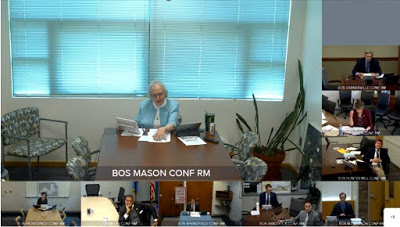Supervisors approve electronic meetings with limited public participation
 |
| The Board of Supervisors, including Mason Supervisor Penny Gross (top), participates in in the April 14 meeting virtually. |
The Fairfax County Board of Supervisors’ approval of an ordinance allowing county governmental entities to meet electronically during the COVID-19 emergency is being challenged by those who believe it will reduce opportunities for public participation on land use decisions.
The ordinance, adopted by the board April 14, is aimed at “assuring the continuity of government” during the coronavirus pandemic, when gatherings of more than 10 people are prohibited. A similar ordinance was passed March 24 applying to the Board of Supervisors itself.
The ordinance allows county boards, authorities, and commissions; independent boards; and regional and interjurisdictional bodies to hold a fully electronic meeting “when it is unsafe or impractical to assemble a physical quorum.”
When one of those boards holds a public hearing during the emergency and members of the public are prevented from presenting their testimony in person, they could submit a statement via audio, telephone, or video.
James Hart, a former member of the Fairfax County Planning Commission, urged the BoS to oppose the ordinance, calling it “so broad and flexible that it invites abuse” of the streamlined emergency process.
The definition of “continuity in Fairfax County government” in the ordinance “is so vague as to be meaningless,” Hart writes. “It includes, ‘without limitation,’ almost anything, including ‘applications . . . or other requests’ and ‘measures that help sustain the county’s economy’ which conceivably could be every land use application that causes economic activity [construction, real estate, commerce, taxes, etc.].”
Related story: Supervisors approve microloans for businesses
By limiting public input to submitting a written statement or a YouTube video or calling in by phone, members of the public won’t be in the room when a developer discusses a land use proposal, Hart says. As a result, they won’t be able to “rebut anything or correct misstatements, or react intelligently to the comments of other speakers.”
“Transparency and accountability of government must be maintained, even during COVID-19,” he says. “Streamlining the public hearing process with such expansive powers goes too far, and severely restricts the citizen participation on any case a supervisor wants to move forward during the virus situation, in any district.”
Tammi Petrine of the Coalition for a Planned Reston and chair of Reston 20/20, also objected to the ordinance. It goes against an opinion by Virginia Attorney General Mark Herring that says public bodies may conduct meetings electronically “if the purpose of the meeting is to address the emergency.” Land use decisions do not meet that criteria, she says.
Petrine is particularly concerned that the “horrendous Sully District project Elm Street Communities Inc.” could be approved under the emergency ordinance when public access is limited.
Land use attorney Craig Blakeley of the Alliance Law Group sent a letter to board chair Jeffrey McKay arguing the ordinance not only exceeds the scope of the attorney general’s opinion, but is overly broad and violates the Dillon Rule, which states localities only have powers that are expressly granted by the state.
The Board of Supervisors also adopted an ordinance April 14 to give Land Development Services the authority to automatically approve plans, plats, grading permits, parking reductions, and Public Facilities Manual modifications and waivers during the coronavirus emergency and during the 60-day period after the emergency ends.
Under current rules, the director of Land Development Services can only approve extensions of development requests on an individual basis, and developers must submit documentation.
Allowing these requests to be automatically approved would remove an “unnecessary impediment to Land Development Services’ operations and to by-right development that is critical to the county’s economic vitality,” the board action states.
This ordinance will help Land Development Services “and our industry partners continue our essential services to homeowners and the development community,” LDS Director Bill Hicks wrote in an email to the building industry.
The ordinance does not apply to building permits, building plans, or preliminary subdivision plats.

